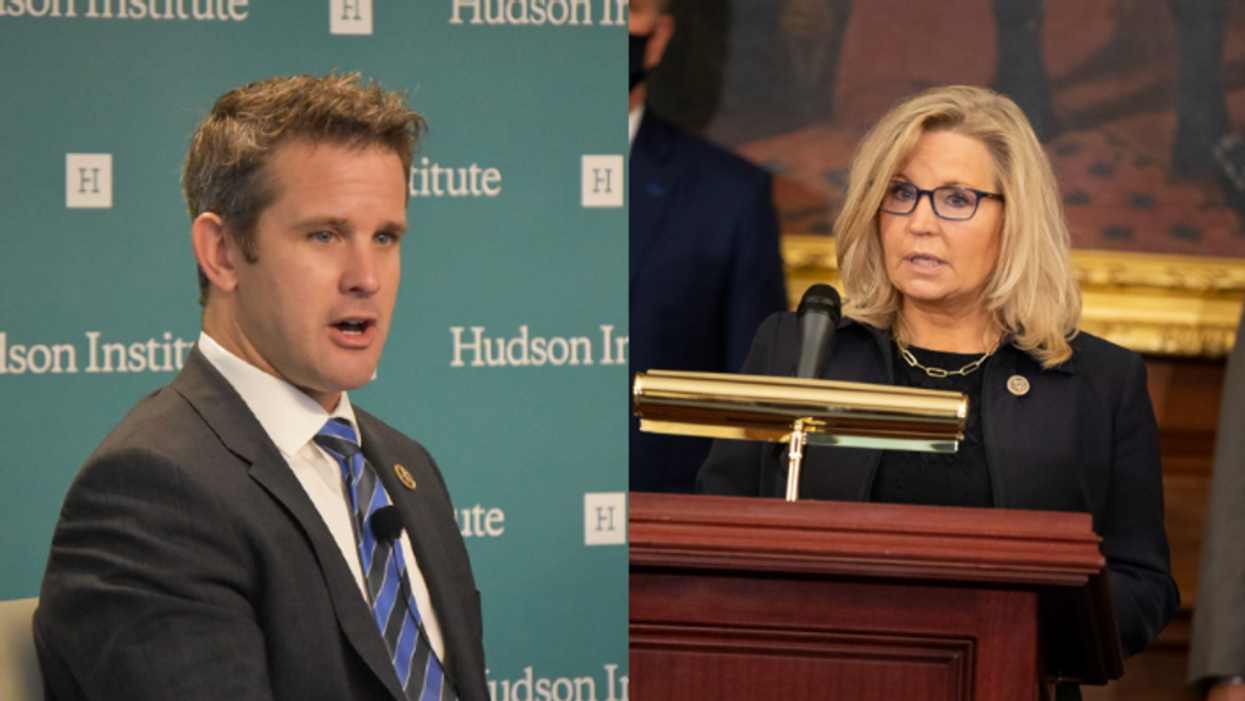Why 'Moderate' Republicans Refused To Censure Gosar
The House on Wednesday voted to censure Rep. Paul Gosar (R-AZ) — a rare punishment for a House lawmaker that's only taken place 23 times in all of American history — over a violent "anime"-style video his staff tweeted on November 8.
The animated video showed Gosar violently decapitating Rep. Alexandria Ocasio-Cortez (D-NY) and attacking President Joe Biden with swords. After Democrats expressed outrage over the video, Gosar tweeted a meme that read, "It's a cartoon. Relax."
Only two Republicans -- Reps. Liz Cheney (R-WY) and Adam Kinzinger (R-IL) -- joined Democrats in punishing Gosar over the video. On Wednesday, Politicoreported that "moderate" Republicans are reluctant to censure Gosar because doing so would force them to censure other colleagues who say and do "crazy" things.
A censure vote is a largely symbolic measure that "registers the House's deep disapproval of member misconduct that, nevertheless, does not meet the threshold for expulsion," according to the Office of the House Historian. Only 23 House members have been censured in the chamber's 232-year history.
House Democrats are moving not only to censure Gosar over his violent video but also strip him of his committee assignments. The chamber is set to vote on the measure on Wednesday.
"Depictions of violence can foment actual violence and jeopardize the safety of elected officials, as witnessed in this chamber on January 6, 2021," the House's censure resolution reads.
Cheney condemned House Minority leader Kevin McCarthy for not condemning Gosar's actions, telling a CNN reporter that McCarthy's actions are "indefensible — morally and ethically."
On Tuesday, Kinzinger defended his decision to vote to censure Gosar.
"We have to hold Members accountable who incite or glorify violence, who spread and perpetuate dangerous conspiracies," Kinzinger tweeted. "The failure to do so will take us one step closer to this fantasized violence becoming real."
Republicans are also backing off because they don't want to create a precedent for having to punish their own members for making violent or offensive comments, according to Politico's report. Such behavior has increased after the 2020 election.
Rep. Marjorie Taylor Greene (R-GA) was kicked off her House committee assignments in February for endorsing calls to execute House Speaker Nancy Pelosi and other offensive statements. Even that vote only drew 11 Republicans.
Since then, Greene has targeted her GOP colleagues for voting for the Infrastructure Investment and Jobs Act — Biden's infrastructure bill that funds highway and bridge repairs and expansions, provides funding for public transportation and will help replace lead water pipes that pose serious health risks to communities across the country.
Rep. Fred Upton (R-MI) received death threats from angry conservatives after he voted for the infrastructure bill.
Other Republican lawmakers have also made violent comments. Before the January 6 insurrection at the Capitol, Rep. Louie Gohmert (R-TX) called for violence after he lost a lawsuit that sought to give Vice President Mike Pence the power to block Biden's Electoral College victory.
"Bottom line is, the court is saying, 'We're not going to touch this. You have no remedy' — basically, in effect, the ruling would be that you gotta go to the streets and be as violent as Antifa and BLM," Gohmert told Newsmax on January 2.
Four days later, violent riots erupted at the U.S. Capitol building.
Over the summer, Rep. Madison Cawthorn (R-NC) warned of "bloodshed" over "rigged elections." In December 2020, Cawthorn also told his constituents to "threaten" other members of Congress. Cawthorn has not faced any punishment for his comments.
In October, Reps. Matt Gaetz (R-FL) and Lauren Boebert (R-CO) fantasized about blowing up the metal detectors outside the House chamber. The metal detectors were put in place after Rep. Andy Harris (R-MD) tried to bring a concealed gun into the chamber in January.
Threats against lawmakers have spiked since the January 6 insurrection — in which some lawmakers feared for their lives as the marauding group of Donald Trump supporters violently broke into the Capitol to try to demand that Trump be kept in power, despite losing re-election.
"This year alone, there has been a 107 percent increase in threats against Members compared to 2020," the United States Capitol Police wrote in a May 7 press release. "Provided the unique threat environment we currently live in, the Department is confident the number of cases will continue to increase."
Published with permission of The American Independent Foundation









Trump Cabinet Nominee Withdraws Over (Sane) January 6 Comments